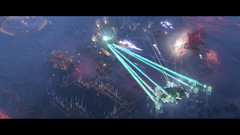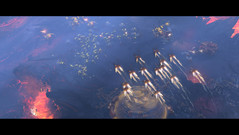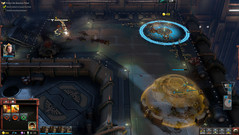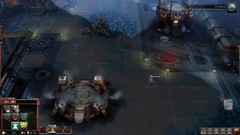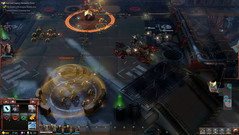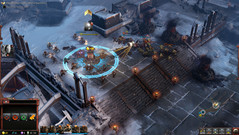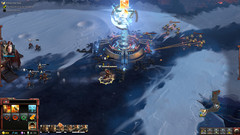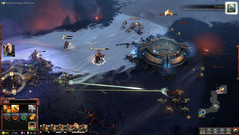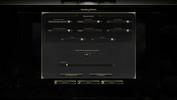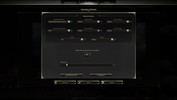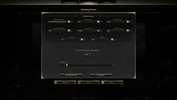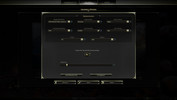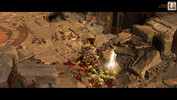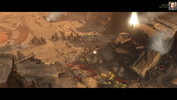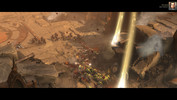Warhammer 40,000: Dawn of War III Notebook and Desktop Benchmarks
Technology
Even though the popular Warhammer universe found its way into PC games quite frequently during the last few years – be it as the turn-based strategy game Total War, the first-person shooter Vermintide, or the third-person action game Space Marine – the last full-blow real-time strategy implementation dates back to 2009, the year Dawn of War 2 was published. And now, eight years later, Dawn of War 3 - developed by Relic Entertainment - is finally here.
Too bad the current version doesn’t really look that much different from its predecessor, and only differs in a few minor details. Units and buildings are nicely animated and very detailed, and explosions look much better as well, but overall the textures are not the most satisfying. Scenery and surfaces seem mushy and soft even on maximum details, and the comic-esque appearance not only reminds us of Starcraft 2, but also cleverly whitewashes the otherwise mediocre graphics. All things considered, graphics and details are okay for a strategy game.
Unfortunately, the game crashed every so often (mostly during startup) on various systems. We also had problems with resolution and display detection – connecting a 4k display did not enable us to select the proper 3840 x 2160 resolution without rebooting, or fiddling with the scaling settings or the GPU driver settings.
The graphics menu turned out to be a mixed bag as well. While hints and explanations are available only a total of 8 settings (including resolution) can be adjusted and tweaked. Two on/off settings and six more or less freely adjustable settings are available.
Automatic settings detection did not work as well as we would have liked to. Graphics details were rather low even with high-performance GPUs, and changing texture details required a restart of the game. Fortunately, the intro videos can be skipped.
Loading times highly depend on the underlying storage medium: the game starts acceptably fast from SSDs but horribly slow from HDDs. The integrated FPS counter is a plus, even though its informative value is questionable, and the size of the game is 29 GB (22 GB download).
As can be seen on the images below, the difference between maximum and high settings is rather insignificant, both in terms of details and performance. The difference between high and normal is more pronounced – besides reduced texture details, the normal setting also features less sophisticated shadows. That said, the game still looks acceptable on normal settings. Going from normal to minimum is immediately obvious – no shadows, mushy and fuzzy textures, and lack of lighting practically single-handedly destroy the entire atmosphere of the game.
Benchmark
The integrated benchmark is a huge plus. In a roughly 40-second long sequence, the game goes through a demanding mass battle. Since evaluation is rather problematic (log written to an external file, evaluation impossible from within the game, and also falsified by recordings that tend to start too early and stop too late) we’ve used Fraps to determine minimum and average frame rates.
Update 5/5/17: upon closer inspection, we found the external evaluation to be as accurate as Fraps. Consequently, from now on we will continue using these values instead of Fraps. The results can be found in your Documents folder under Games Dawn of War III LogFiles.
Across-the-board statements in regards to graphics performance and capabilities are hard to make, because performance varied greatly depending on zoom level, number of units and effects on screen, etc. An average of 30 fps in the integrated benchmark should suffice for a smooth campaign gaming experience. Unlike first-person-perspective games that only seem truly smooth at more than 40 fps, real-time strategy games are less demanding in this regard.
Results
Considering overall graphics quality, hardware requirements are surprisingly high. Intel’s integrated HD Graphics GPUs are too slow even at only 1280 x 720 and minimum details (no AA). Medium details at 1366 x 768 (medium AA) require at least a GeForce GTX 950M or better yet, a GTX 960M, and high details (no AA) at FHD (1920 x 1080) won’t be any fun with anything slower than a GeForce GTX 965M or GTX 970M. High details (AA high) at FHD and maximum details require at least a GeForce GTX 980M/GTX 980 or GeForce GTX 1060, respectively, for an enjoyable gaming experience.
4k gaming on high details with anti-aliasing enabled is all but unplayable even with high-end graphics cards like Nvidia’s GeForce GTX 1080. As expected, the processor is much less important overall, and it becomes the limiting factor only at low resolutions and on low settings. During the tests, we had upscaling disabled (100 % gameplay resolution).
| Warhammer 40.000: Dawn of War III | |
| 3840x2160 High / On (100 % Gameplay Resolution) AA:High 1920x1080 Maximum / On (100 % Gameplay Resolution) AA:High 1920x1080 High / On (100 % Gameplay Resolution) AA:High 1920x1080 Medium / On (100 % Gameplay Resolution) AA:Medium 1366x768 Medium / On (100 % Gameplay Resolution) AA:Medium 1280x720 Minimum / Off (100 % Gameplay Resolution) | |
| NVIDIA GeForce GTX 1080 (Desktop), 6700K | |
| NVIDIA GeForce GTX 1070 (Desktop), 6700K | |
| NVIDIA GeForce GTX 1070 (Desktop), 4790K | |
| NVIDIA GeForce GTX 1070 Mobile, 6820HK | |
| NVIDIA GeForce GTX 980, 6700K | |
| NVIDIA GeForce GTX 1060 (Desktop), 6700K | |
| NVIDIA GeForce GTX 1060 Mobile, 6820HK | |
| AMD Radeon RX 480 (Desktop), 4790K | |
| AMD Radeon RX 470 (Desktop), 4790K | |
| NVIDIA GeForce GTX 980M, 4700MQ | |
| NVIDIA GeForce GTX 1050 Ti (Desktop), 4790K | |
| NVIDIA GeForce GTX 1050 Ti Mobile, i7-7700HQ | |
| NVIDIA GeForce GTX 970M, 4700MQ | |
| AMD Radeon R7 370, 4790K | |
| AMD Radeon RX 460 (Desktop), 4790K | |
| NVIDIA GeForce GTX 1050 Mobile, i7-7700HQ | |
| NVIDIA GeForce GTX 1050 (Desktop), 4790K | |
| NVIDIA GeForce GTX 960M, 4720HQ | |
| NVIDIA GeForce GTX 950M, 6700HQ | |
| NVIDIA GeForce 940MX, 6700HQ | |
| Intel HD Graphics 4600, 4700MQ | |
Overview
Test Systems
| Desktop-PCs | Plattform I | Plattform II |
|---|---|---|
| Motherboard | Asus Z170-A | Asus Z97-Deluxe |
| Processor | Intel Core i7-6700K (Skylake) | Intel Core i7-4790K (Haswell) |
| Graphics Card | MSI GeForce GTX 1080 (8 GB GDDR5X) MSI GeForce GTX 1070 (8 GB GDDR5) Nvidia GeForce GTX 1060 (6 GB GDDR5) Nvidia GeForce GTX 980 (4 GB GDDR5) |
Nvidia GeForce GTX 1080 (8 GB GDDR5X) Asus GeForce GTX 980 Ti (6 GB GDDR5) XFX Radeon R9 Fury (4 GB HBM) Sapphire Radeon R9 290X (4 GB GDDR5) Sapphire Radeon R9 280X (3 GB GDDR5) MSI Radeon R7 370 (2 GB GDDR5) |
| RAM | 2x 8 GB DDR4-2133 | 2x 4 GB DDR3-1600 |
| Storage | Crucial MX100 SSD (256 GB) Crucial M500 SSD (480 GB) OCZ Trion 100 SSD (480 GB) OCZ Trion 150 SSD (960 GB) |
Intel SSD 530 (240 GB) OCZ Trion 100 SSD (480 GB) |
| Operating System | Windows 10 Pro 64 Bit | Windows 10 Home 64 Bit |
| Schenker Notebooks | Schenker W504 | Schenker XMG A505 | Schenker S413 |
|---|---|---|---|
| Processor | Intel Core i7-4700MQ (Haswell) | Intel Core i7-4720HQ (Haswell) | Intel Core i7-4750HQ (Haswell) |
| Graphics Card | Nvidia GeForce GTX 980M (8 GB GDDR5) GTX 970M (6 GB GDDR5) GTX 880M (8 GB GDDR5) GTX 870M (6 GB GDDR5) GTX 860M Kepler (4 GB GDDR5) |
Nvidia GeForce GTX 960M (2 GB GDDR5) | Intel Iris Pro Graphics 5200 |
| RAM | 2x 4 GB DDR3-1600 | 2x 4 GB DDR3-1600 | 2x 8 GB DDR3-1600 |
| Storage | Samsung SSD 840 EVO (250 GB) | Micron M600 SSD (128 GB) HGST Travelstar 7K1000 HDD (1.000 GB) |
Intel SSD |
| Operating System | Windows 10 Pro 64 Bit | Windows 10 Home 64 Bit | Windows 10 Home 64 Bit |
| MSI Notebooks | MSI GT62VR | MSI GE72 | MSI PE60 | MSI GP62 | MSI CX61 | MSI CX61 | MSI GE 72 7RE-046 | MSI GL62 7RD |
|---|---|---|---|---|---|---|---|---|
| Processor | Intel Core i7-6820HK (Skylake) | Intel Core i7-6700HQ (Skylake) | Intel Core i7-6700HQ (Skylake) | Intel Core i7-5700HQ (Broadwell) | Intel Celeron 2970M (Haswell) | Intel Core i5-4200M (Haswell) | Intel Core i7-7700HQ (Kaby Lake) | Intel Core i7-7700HQ (Kaby Lake) |
| Graphics Card | Nvidia GeForce GTX 1060 (6 GB GDDR5) | Nvidia GeForce GTX 965M 2016 (2 GB GDDR5) | Nvidia GeForce GTX 950M (2 GB GDDR5) | Nvidia GeForce 940M (2 GB DDR3) | Nvidia GeForce 920M (2 GB DDR3) | Nvidia GeForce GT 720M (2 GB DDR3) | Nvidia GeForce GTX 1050 Ti | Nvidia GeForce GTX 1050 |
| RAM | 4x 8 GB DDR4-2133 | 1x 8 GB DDR4-2133 | 2x 4 GB DDR4-2133 | 1x 8 GB DDR3-1600 | 1x 8 GB DDR3-1600 | 1x 8 GB DDR3-1600 | 2x 4 GB DDR4 | 2x 4 GB DDR4 |
| Storage | Samsung NVMe MZVPV128 SSD (128 GB) | Toshiba THNSNJ128G8NU SSD (128 GB) WDC WD10JPVX HDD (1.000 GB) OCZ Trion 100 SSD (480 GB) |
Toshiba MQ01ABF050 HDD (500 GB) | WDC Scorpio Blue HDD (1.000 GB) | Samsung SSD, Toshiba Trion 150 SSD | Samsung SSD, Toshiba Trion 150 SSD | ||
| Operating System | Windows 10 Pro 64 Bit | Windows 10 Home 64 Bit | Windows 10 | Windows 10 | Windows 10 | Windows 7 Home Premium 64 Bit | Windows 10 64 Bit | Windows 10 64 Bit |
| Asus Notebooks | Asus G752VS | Asus N551ZU | Asus ROG Strix GL753VD |
|---|---|---|---|
| Processor | Intel Core i7-6820HK (Skylake) | AMD FX-7600P (Kaveri) | Intel Core i7-7700HQ |
| Graphics Card | Nvidia GeForce GTX 1070 (8 GB GDDR5) | AMD Radeon R9 M280X (4 GB GDDR5) | Nvidia GeForce GTX 1050 |
| RAM | 4x 16 GB DDR4-2400 | 2x 4 GB DDR3-1600 | 2x 8 GB DDR4 |
| Storage | Toshiba NVMe THNSN5512GPU7 SSD (512 GB) | Samsung SSD 830 (256 GB) | Micron SSD 1100 (256 GB) |
| Operating System | Windows 10 Pro 64 Bit | Windows 10 64 Bit | Windows 10 64 Bit |
| 4K Monitor | Nvidia driver | AMD driver | Intel driver |
|---|---|---|---|
| 2x Asus PB287Q | ForceWare 381.89 | Crimson 17.4.4 | 15.40.34.4624 |




